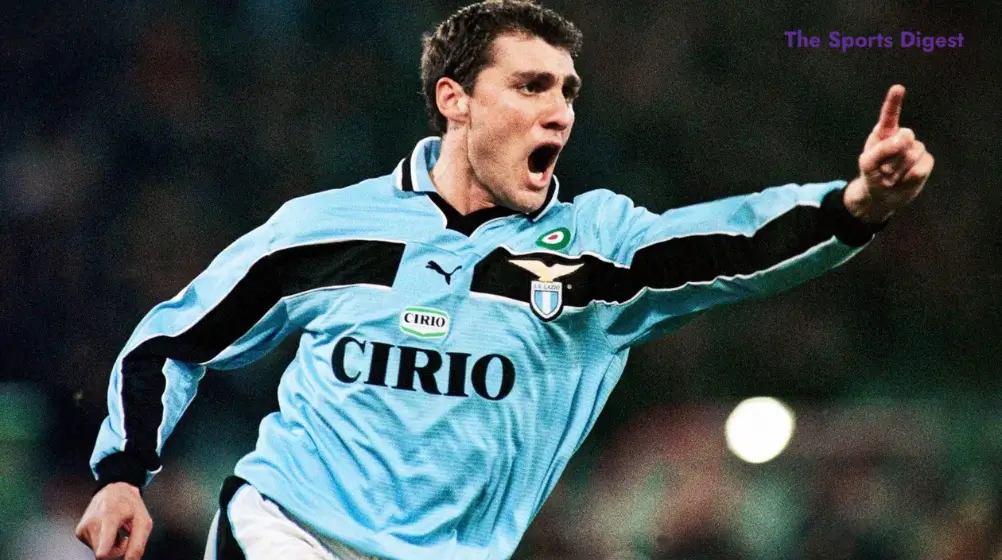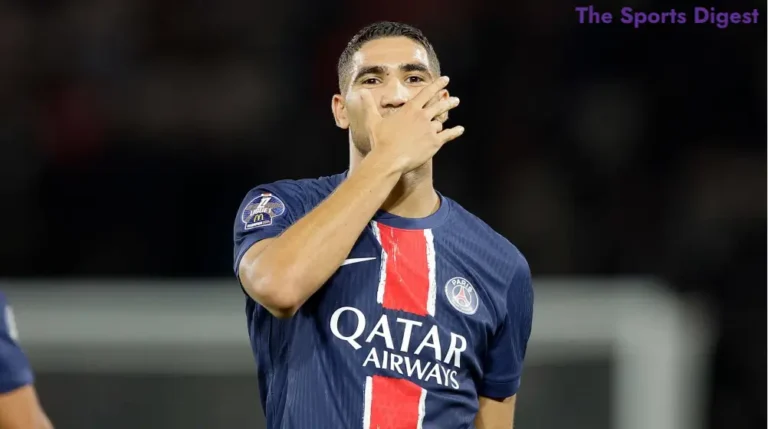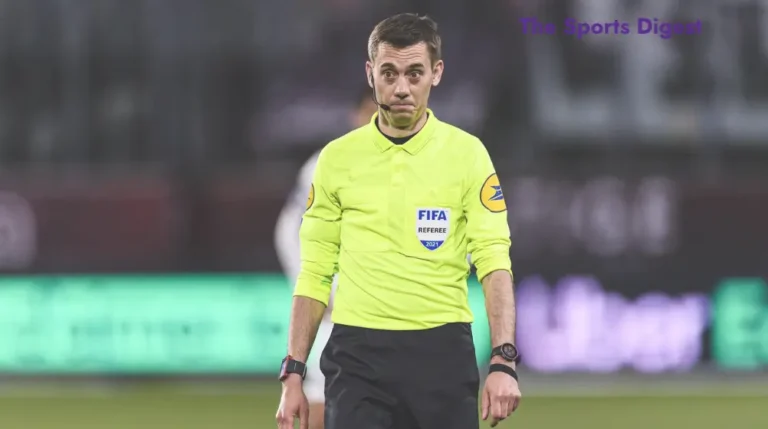Christian Vieri: Brilliance and Bad Luck
The final day of the 2001/02 Serie A season encapsulated Christian Vieri career in 90 painful minutes. Inter Milan needed only to defeat Lazio to secure the title, and the stars seemed aligned. Christian Vieri was starting alongside the Brazilian phenomenon Ronaldo—a rare occurrence due to their persistent injury problems—and had given Inter the lead with a clinical finish. Victory and glory seemed inevitable.
Then came the collapse. Sloppy defending allowed Lazio to mount a comeback, eventually defeating Inter 4-2. The Scudetto slipped away to Juventus and Roma, leaving Vieri and Inter empty-handed yet again. To compound the heartbreak, while Christian Vieri licked his wounds, his strike partner Ronaldo would soon lift the World Cup with Brazil. It was a microcosm of Vieri’s career: moments of brilliance repeatedly overshadowed by cruel twists of fate.
Table of Contents
World Cup Wonder: Christian Vieri International Pedigree
If Vieri’s club career was marked by unfulfilled promise, his performances on the international stage revealed his true caliber. The 1998 World Cup in France was Vieri’s coming-out party on the global stage. Partnering with the legendary Roberto Baggio, he announced himself to the world with five goals in Italy’s run to the quarter-finals.
His finishing showcased remarkable versatility: a neat left-footed strike against Chile, an exquisite right-footed chip against Cameroon followed by a poacher’s finish for his second in the same match, a close-range header against Austria, and finally, a goal against Norway that demonstrated his pace, power, and poise. Italy’s journey ended in the quarter-finals with a penalty shootout defeat to eventual champions France, but Christian Vieri had made his mark.
The 2002 World Cup in Japan and South Korea promised even more. Part of an arguably stronger Italian squad, Christian Vieri maintained his prolific form with two excellent left-footed shots against Ecuador and another goal against Croatia, despite Italy’s defeat in that match.
Then came the infamous second-round encounter with South Korea—a match that would haunt Italian football for years. After Gianluigi Buffon saved an early penalty, Vieri put Italy ahead with a powerful header despite being shirt-pulled. But a defensive error allowed South Korea to equalize, setting the stage for one of Vieri’s most painful moments: a golden opportunity missed from just six yards out.
What followed only compounded the misery. Francesco Totti received a controversial red card, and Ahn Jung-hwan’s late header sent Italy crashing out. The Italian media’s focus on the referee’s performance perhaps shielded Christian Vieri from excessive criticism for his miss, but the pain lingered—especially as Ronaldo went on to lift the World Cup trophy shortly after.
Cruelly, a knee injury would rob Vieri of the chance to be part of Italy’s World Cup-winning squad in 2006. Despite this, his nine goals across two tournaments tied him with Roberto Baggio and Paolo Rossi as Italy’s top World Cup finals scorers—an impressive legacy for a player often overlooked in discussions of Italian football greats.
A Nomadic Club Career: From Australia to Serie A Stardom
Vieri’s journey to football stardom was far from conventional. Born in Italy, he spent much of his childhood in Australia, where he developed a love for cricket that remained with him throughout his life. His family returned to Italy in 1988, setting the stage for his professional football career.
After making his debut for Torino in the Coppa Italia and being an unused substitute in their 1992 UEFA Cup final defeat, Vieri’s early career took him through the lower leagues. Spells with Pisa, Ravenna, and Venezia in Serie B helped him develop his craft before Atalanta gave him his first real opportunity in Serie A.
His breakthrough at Atalanta earned him a move to European champions Juventus, where he won the Scudetto alongside Alen Bokšić. Despite reaching the Champions League final (a defeat to Borussia Dortmund) and posting solid if unspectacular goal returns, Christian Vieri left after just one season—a decision he would later express regret over.
Financial considerations saw him move to Atlético Madrid, where he truly announced himself as an elite striker by becoming La Liga’s top scorer with 24 goals, even as the team underperformed. A return to Italy with Lazio brought further success, including scoring the opener in the last ever Cup Winners’ Cup final victory and narrowly missing out on the Serie A title.
The Inter Years: Promise, Production, and Disappointment
In 1999, Inter Milan made Christian Vieri the world’s most expensive player, hoping he would restore glory to the Nerazzurri. His six-year spell at the club would be his longest at any team, but despite his consistent goalscoring, major trophies remained elusive.
The 2002/03 season saw Christian Vieri claim the Serie A top scorer award with 24 goals, but team success continued to elude him. Even when Inter reached the Champions League semi-final, fate intervened—injury ruled him out of the crucial Milan derby matches that ended their European dreams.
Injuries became a recurring theme, limiting his effectiveness despite his continued goal threat. By the time he finally won a trophy with Inter—the Coppa Italia in 2005—his powers were beginning to wane.
The Final Chapters: Decline and Retirement
What followed was a series of moves that failed to recapture his previous heights. A controversial transfer to rivals AC Milan yielded little success, prompting a move to Monaco in search of form and an international recall. Though he initially scored for his new club, another knee injury ended both his season and World Cup hopes for 2006.
Return stints at Atalanta and Fiorentina, followed by a final spell back at Atalanta, brought his career full circle before he retired at 36, his body no longer able to deliver what his mind demanded.
A Legacy of What Might Have Been
For the best part of a decade, Christian Vieri ranked among Europe’s most feared and sought-after strikers. His inclusion in Pelé’s FIFA 100 list of the greatest living footballers confirmed his status among the game’s elite. His World Cup goal-to-game ratio even surpassed that of his former strike partner Ronaldo.
Yet his legacy remains somewhat bittersweet. Unlike other Italian legends such as Baggio, Rossi, Maldini, or Baresi, Vieri’s trophy cabinet never matched his talent. Just one league title to his name places him alongside figures like Alan Shearer—brilliant goalscorers whose team achievements didn’t reflect their individual brilliance.
His career was defined by the heights of individual excellence and the lows of collective disappointment: Champions League final defeat, missed European Championships and Champions League semi-finals through injury, and that infamous miss against South Korea.
But perhaps what makes Vieri’s story so compelling is the remarkable trajectory of his journey—from a cricket-loving teenager in Australia to one of world football’s deadliest strikers. In a sport that celebrates perfect narratives, Christian Vieri’s imperfect career reminds us that even the greatest talents sometimes dance with misfortune.
Have you ever read an article like this?
There are no reviews yet. Be the first one to write one.






